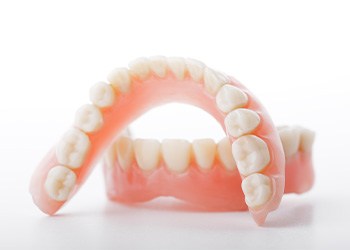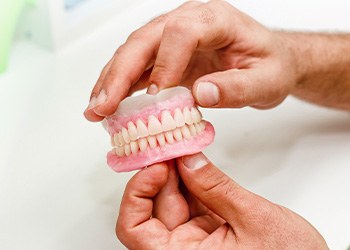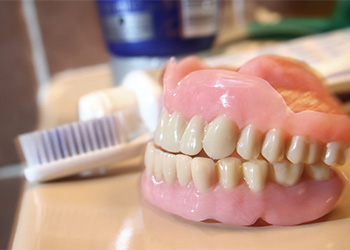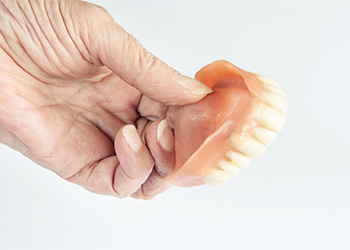Dentures – Lewisville, TX
A High-Quality Solution for Restoring Your Smile

If you’re missing a few, most, or all of your teeth, then you probably know how difficult it can be to eat comfortably, speak clearly, and smile confidently. The good news is that you can renew the pearly whites you lost with cost-effective and reliable dental restorations. Our team at Sehnert Precision Dentistry can restore missing teeth with dentures in Lewisville. With this high-quality and durable tooth replacement option, you’ll be able to use and show off your full smile again! Read on or give us a call today to learn more.
Why Choose Sehnert Precision Dentistry for Dentures?
- Durable, Lifelike & Long-Lasting Dental Restorations
- Expert, Caring & Dedicated Dental Staff
- Accepts Dental Insurance & Offers CareCredit Financing
Who’s a Good Candidate for Dentures

The majority of those who are missing some or all of their teeth can be eligible for dentures. Due to the versatility of this treatment, our team can customize the prosthetics to fit your specific dental needs without having to deal with many strict requirements. Still, we’ll need to evaluate your oral health and examine your smile so that we can determine if you’re a good candidate for dentures. We can also walk you through other tooth-replacement options, such as dental bridges and implants, in case these services are best for your situation.
Effects of Missing Teeth
People can lose their teeth for any number of reasons—from accidental injury to severe dental decay to poor oral hygiene. Periodontal disease can also lead to tooth loss because the connective tissues won’t be able to hold the tooth properly in position. Whatever the reason is, several downsides can come from missing some or all of your teeth. Not only will it make your daily oral tasks more difficult, such as eating, speaking, and smiling, but it can also lead to jawbone deterioration since there’s a lack of tooth roots to stimulate the bone. Furthermore, your self-esteem can diminish because of your facial changes, which can increase the risk of depression and an unwillingness to interact in social settings. With dentures, you can significantly reduce your anxieties about your smile while also improving your oral capabilities.
What Qualifies You for Dentures
Patients who are struggling with missing several or all of their teeth can most likely benefit from dentures. Our team will develop a detailed treatment plan that is tailored to your specific needs to ensure the best functionality and comfort. We will also evaluate your oral health to check for any developing or underlying oral health issues, such as tooth decay and gum disease. If we detect any concerns, then you’ll likely need to undergo preliminary treatments to address them before we can move on to fabricating your dentures. This way you can renew and preserve a healthy smile!
Alternative Tooth-Replacement Options
Dentures might not always be the most viable option for your specific situation. If so, our team can discuss your alternative solutions for rebuilding your smile. These include:
- Dental Bridges: These prosthetics consist of two dental crowns supported by healthy natural teeth on either side of the gap that is connected by pontics. This procedure involves removing some enamel to make space for the crowns, and the results can last around 10 years before needing replacements.
- Dental Implants: Titanium posts can be surgically embedded into your jawbone, providing the stable structure necessary to hold your future restoration(s) in place. This solution requires months to complete, but the results can go for 30 years to the rest of your life with proper care.
Types of Dentures

Depending on the location and number of missing teeth, we can offer several various kinds of dentures. Our team will evaluate your smile and determine which of the following options will be best for you:
Partial Dentures

Are you missing several teeth in a row or multiple places? If so, a partial denture may be the ideal solution for your situation. Not only can it replace teeth on opposite sides of your mouth, but it can also prevent adjacent teeth from shifting out of place or closing the gaps. This restoration will be crafted based on the impressions we take of your smile, so it should fit perfectly and match seamlessly with the rest of your pearly whites.
Full Dentures

Unlike partials which rely on healthy neighboring teeth for support, full dentures will depend on the shape of your mouth and the suction of the gums. These restorations can replace an entire arch of missing teeth. Both upper and lower dentures will be created with a gum-colored base and have enamel-colored prosthetic teeth, providing a natural-looking solution for your smile.
Implant Dentures

If you’re looking for a longer-lasting and more secure tooth replacement option, then dental implant dentures may be your best bet. Instead of relying on nearby teeth or gum suction, these restorations will be directly anchored to your jawbone via titanium posts. Not only will they be much less likely to shift out of place, but they’ll also return about 80% or more of your biting power. With proper care, you can even expect them to last you several decades longer than traditional dentures.
How Dentures are Made

No two dentures are exactly alike. After all, every patient’s mouth is unique! Each prosthesis needs to be customized to ensure the best possible fit as well as an aesthetically pleasing appearance. If you’re curious to learn more about how dentures are made, read below. You’ll find a brief summary of the materials commonly used to make dentures as well as a look at the creation process.
What are Dentures Made Of?

The two main parts of a denture are the base and the artificial teeth, both of which are made with carefully chosen materials:
- The denture base can sometimes be made from nylon or various other materials. However, more often than not, acrylic is used due to its ability to mimic the appearance of the gums. Full dentures and partial dentures can both have acrylic bases, but partial dentures also typically have clasps made out of metal.
- The artificial teeth will often be made out of porcelain. This material is known for its durability, and it offers the added advantage of closely resembling natural tooth enamel.
The Denture Creation Process

When you decide to get dentures, our team will need to take impressions of your gums and create a model of your mouth. Once the model is ready, we will send it to a dental laboratory so that the creation process can begin. The technicians at the lab will make a replica of your gums out of wax, then set the artificial teeth in place with a device called an articulator.
After making any slight adjustments that might be necessary, the technicians will send the wax dentures to our team. At this point, we’ll schedule an appointment with you to make sure that the dentures fit correctly. Once we’ve confirmed that everything looks good, we’ll return the dentures to the lab for the next phase of the process.
At this point, it will be time to replace the wax base with an acrylic one. To do this, the dentures will be placed into a flask, which will then be immersed in hot water. The heat will cause the wax portions to melt away; however, plaster will be used to help the dentures keep their shape. Once the wax is gone, acrylic can be injected.
The plaster will be removed from the now-completed dentures, and unneeded acrylic will be trimmed away. The technicians will then give your dentures a final polish before returning them to our office.
At this point, you’ll finally be ready to receive your new prosthesis. Note that our team may need to make a few last-minute adjustments to make sure there aren’t any problems with your dentures.
Adjusting to Your New Dentures

It will take a while to get used to your dentures, but rest assured that any discomfort you experience should fade over time. Eating softer foods and performing facial exercises can often help while you’re in the process of adjusting to your dentures. If your discomfort lasts longer than expected, please let us know.
Benefits of Dentures

If you have multiple missing teeth, you may be all too familiar with the inconveniences and complications that your condition can cause on a daily basis. Dentures can help with many of those issues! A well-made prosthetic has the potential to increase your confidence, support your overall health, and allow you to enjoy a heightened quality of life. Continue reading below to learn about some specific benefits that you may enjoy after you receive your beautiful new teeth.
Psychological Benefits
The sad reality is that many individuals with missing teeth tend to suffer profound effects on their emotional and mental health. For example, they might isolate themselves socially and miss out on the benefits of meaningful interactions with other people. They might also suffer from anxiety related to the embarrassment of having an incomplete smile or their inability to chew foods easily. Their self-esteem could fall short of its potential.
If you can relate to those problems, dentures may support your mental health. By allowing you to eat and converse with ease, they may significantly increase your daily level of happiness!
Clearer Enunciation
Clear speech is the product of complex interactions between several anatomical structures, including the teeth. Without a full set of teeth, you may struggle to clearly enunciate certain sounds.
When you first get dentures, you might develop a slight lisp. After a bit of time and practice, however, you should notice that it is much easier for you to speak. In fact, your speech should ultimately be clearer and easier than it was before you got your prosthetic!
Improves Nutrition
If you have few to no natural teeth left, it could drastically affect your dietary choices. For example, you might gravitate toward foods that have very little nutritional value. As a result, your overall health could start to suffer.
Dentures can equip you to eat a wide variety of foods, including most fruits, vegetables, lean proteins, and other foods that are important for supporting overall wellness. A well-balanced diet can have head-to-toe health benefits!
Preserves Oral Health
If you still have some of your natural teeth, dentures may benefit them in a couple of ways:
- Dentures can prevent dental drift. In other words, they can serve as a placeholder that prevents your natural teeth from shifting out of place and interfering with the harmony of your bite.
- Dentures can take some of the stress of chewing. Your prosthetic can allow you to distribute food evenly across your mouth, which can reduce wear and tear on your natural tooth enamel.
Expands Opportunity
Your teeth, or your lack thereof, can have big effects on the way people perceive you. If people believe you have poor oral health, you may be less likely to find a new job or reach your potential in the workplace. A well-made denture can give you a confident smile and project the impression that you are youthful, successful, and approachable. You might be surprised by the power of a beautiful, strong set of teeth!
Understanding the Cost of Dentures

Are you unsure how much you can expect to pay for your new smile? When choosing customized prosthetics, it’s important to have an idea as to how much you should budget, as costs can rise depending on various factors. During your initial appointment, a member of our team will examine your oral anatomy. Once all findings are compiled, you will learn which method of treatment is right for your needs.
Factors That Affect the Cost of Dentures
A complete and thorough evaluation of your smile is necessary to determine how much your estimated costs will be. These often include:
- The number of teeth that are missing
- If preliminary treatments are necessary (i.e., bone grafting, periodontal therapy, tooth extraction)
- The types of materials used to create dentures (typically acrylic and/or porcelain)
Although it is possible to find dentists that offer cheaper materials to help cut down on expenses, you’ll quickly find that paying more for longer-lasting prosthetics is well worth the investment. Otherwise, you’re left to the shifting changes and deterioration of the jawbone. By choosing higher-quality materials, you’ll be more likely to enjoy your new smile for longer.
Are Implant Dentures More Expensive?
Yes, it is true that implant dentures are more expensive than traditional varieties. The reasons are many, but the truth is that by opting for implant dentures, you will receive prosthetics that are known to last a lifetime. Made from durable titanium – a material that easily fuses with the jawbone – they can restabilize and improve functionality to allow for easier eating, speaking, and smiling.
Does Dental Insurance Cover Dentures?
There is a good chance that your dental insurance will cover the cost of your dentures as long as you are filing the claim correctly. Our team will be happy to handle this aspect of treatment so that you can focus more on your smile and less on the financial frustrations and components of dentistry. Most insurance companies will agree to pay up to 50% of the total cost depending on whether your deductible is met and how much of your available funds remain in your annual maximum.
Other Options for Making Dentures Affordable
Apart from the use of dental insurance, we also make it easy for patients to enroll in flexible financing through CareCredit as well as provide an in-house membership plan. No matter which method you choose, we can discuss your options and help you fill out the necessary information so that you get the care you need while sticking with a price you can afford.
Dentures Aftercare

Even if all of your natural teeth are gone, our team at Sehnert Precision Dentistry will remain your reliable partners in oral health care. Be sure to continue visiting our office at least two times every year; not only will we be able to check for gum disease, oral cancer, and other issues that are best dealt with as quickly as possible, but we can also evaluate the condition of your dentures to see if any problems have come up.
The average lifespan of dentures is around 7 to 10 years. Generally speaking, dentures that are properly cared for tend to last longer. You can protect your new prosthesis by following these simple tips.
Removable Dentures
Remove After Eating

Dentures can help make meals enjoyable again by letting you eat a wider variety of foods. Of course, once you’re done eating, you can expect there to be some food particles left behind. As such, after each meal, you should make a quick trip to the nearest available sink so that you can rinse off your dentures. Always check the temperature of the water first; you don’t want it to be too hot, or it may end up causing the shape of your dentures to change.
Clean Your Restoration

Dentures need to be cleaned at least once a day. After taking them out of your mouth, you can brush them with a nonabrasive cleaning material such as hand soap or mild dish soap. (Naturally, specialized denture cleanser is also an option.) Make sure that the toothbrush you’re using has soft bristles that are unlikely to damage your prosthesis. You definitely don’t want any cleaning materials to still be on the denture when you put it back in, so end every cleaning session with a thorough rinse.
Keep Your Dentures Safe

Accidents can always happen, which is why it pays to take steps to minimize the chances of breaking your dentures by mistake. Put a towel or another soft object beneath you whenever you take your dentures out; if you happen to drop them, you don’t want them to fall directly onto a hard surface. Also, if there are any small children or pets in your home, you should always keep your dentures in a spot where they can’t get to them.
Remove Dentures When You Sleep

As convenient as the idea of wearing your dentures 24/7 might sound, you do need to take your prosthesis out periodically for the sake of oral health and hygiene. As such, it’s highly recommended that you remove your dentures at night just before you go to sleep. When your dentures aren’t in your mouth, they should be in a container filled with a cleaning solution to keep them from drying out.
Notice Changes

Have the gums underneath your dentures become irritated lately? Are any of your false teeth broken? Do your dentures sometimes shift around when you don’t want them to? Inform us immediately if you notice anything different so that we can fix, adjust, or replace your dentures as needed.
Denture FAQs

Our team here at Sehnert Precision Dentistry understands the heavy toll that tooth loss can take on your physical and mental wellbeing! Your teeth are an important part of you, so having them replaced is certainly in your best interest; however, you might have several questions concerning restoration options like dentures in Lewisville. For your convenience, we’ve gathered a few of the most frequently asked questions that we receive about dentures so that you can feel assured about restoring your smile and confidence! If you have any other questions about dentures or would like to schedule a visit, feel free to give us a call for assistance.
Will It Hurt to Get Dentures?
If you need to have teeth extracted prior to receiving dentures, you’ll probably experience some mild discomfort following the procedure. However, this pain can often easily be managed by taking your prescribed and over-the-counter pain relievers as instructed, and it typically only lasts for a few days. When you first receive new dentures, some minor irritation might occur as your mouth adjusts to the new appliance. This adjustment period varies from person to person, but it can sometimes take weeks or months. If this pain continues to persist, you should contact us promptly; it could be a sign that your dentures weren’t fitted properly, or there might be an underlying oral health issue that necessitates treatment.
Can I Sleep with My Dentures?
When you first receive your dentures, you’ll likely be asked to wear it for at least the first 24 hours, including sleep; however, you should be taking it out every evening after that. Wearing dentures restricts the circulation in your gums, which can lead to soft tissue irritation. Taking them out encourages healthy blood flow, and also gives your gums and jaw the chance to rest after supporting them all day. Removing your dentures before bedtime also gives you the perfect opportunity to soak them in a cleaning solution or water, which will keep them clean. The dark, moist spaces underneath dentures is an ideal place for bacteria to thrive; in fact, sleeping with dentures has been found to be associated with a higher risk of pneumonia, among other problems such as higher levels of gum and tongue plaque.
What Can’t You Eat with Dentures?
Even though they effectively replace lost teeth, dentures are also accompanied by certain dietary restrictions that need to be followed closely. Sticky foods like peanut butter, taffy, and other chewy items can pull your dentures out of place. Some foods, such as popcorn, shelled nuts, and even the seeds on certain types of bread are also problematic, as they contain small bits that can become trapped underneath the dentures. Tough meats like steak, pork chops, and other items that require an excessive amount of chewing can also place a lot of unneeded stress on your dentures and gums alike.
Is It Hard to Talk with Dentures?
When you first get your dentures, it’ll take some time for you to become accustomed to speaking with them. For the first few weeks, you might talk with a slight lisp or stutter, or muffle certain words. However, as with anything in life, practice makes perfect—you can speed up this adjustment process and master talking with your dentures by reading things out loud whenever you have the chance or practicing conversing with a friend or family member. Also applying a small amount of adhesive can help to stabilize your dentures and make your speech a tad clearer.
Do Dentures Break Easily?
While each denture from our Lewisville office is designed to be incredibly durable, these appliances do not last forever and can last between five to seven years if they receive excellent care. However, dentures can be damaged if they are exposed to too much stress, and they are commonly broken due to being dropped while being cleaned, inserted, or removed. These appliances can also break due to poor fit or small flaws in their bases such as notches and scratches. Dentures can also break down over time due to the stress of repeated use.
What Should You Do if Your Dentures Break?
The most serious damage a denture can develop is prosthesis fracture, meaning that it breaks in two. This problem is more common among top dentures, but it can happen to appliances replacing the bottom teeth as well. Dr. Sehnert will be able to repair or replace your denture depending on the severity of the damage, so contact our office as soon as you notice any issues. In cases of minor damage such as cracks or chips in the artificial teeth, we may be able to address the problem in a single visit. However, more serious issues will require us to send the appliance to a trusted dental lab for adjustments or have the device replaced altogether.
Can Dentures Lose Their Fit Over Time?
We customize each denture from our Lewisville office to ensure it is remarkable comfortable, but your appliance will probably lose its fit over time due to wear and tear and the changing shape of the mouth. This often happens because dentures do not restore the stimulation the jawbone needs to remain healthy and strong, which leads to its atrophy. Wearing an appliance that fits poorly can lead to a range of oral health issues like soreness, swollen gums, bad breath, trouble speaking, and oral infections. If your dentures don’t fit comfortably anymore, bring them to our office in Lewisville so we can adjust or replace them as needed. You may wish to experiment with denture adhesives to help your appliances stay in place comfortably between adjustments.
Am I Too Young to Get Dentures?
Tooth loss is commonly associated with older adults, and more than half of all seniors wear some type of denture. However, young people frequently lose teeth due to accidents or oral infections. According to the National Center for Health Statistics, about two-thirds of adults between the ages of forty and sixty and one-third of those between twenty and thirty-nine are missing at least one tooth. Fortunately, adults of any age can potentially be excellent candidates for dentures.
